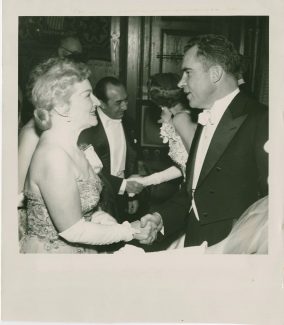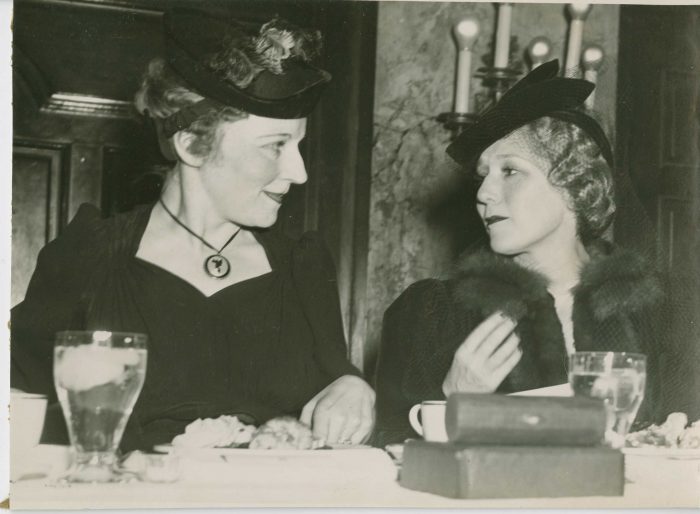A new biography of Hope Ridings Miller looks at the journalist’s life and legacy.

Author Joseph Dalton; “Washington’s Golden Age” Book Cover
“I went as a guest, and hoped they’d soon forget I was a reporter.” Such is the life of a society writer, one that Hope Ridings Miller (1906-2005) lived to the fullest. The pioneering journalist worked the society beat at the Washington Post from 1937 until 1944 before becoming editor-in-chief of the now-defunct glossy magazine Diplomat, and then writing three books on Washington society. Miller’s cousin Joseph Dalton is just one author who looked up to the wordsmith and Washington hostess. His new book, “Washington’s Golden Age,” covers the small-town Texas native’s career path, how she blazed the trail for women in her field and navigated the changing ways of Washington.

Hope Ridings Miller greets
Vice President
Richard M. Nixon at a reception
in the mid-1950s
Washington Life: Hope wrote in the heyday of Washington society, during the New Deal and World War II. What was the social scene like at that time?
Joseph Dalton: There was an assumption of dignity and respect among all the [political] players and the social scene enforced that. It fostered alliances and bridges and understanding among legislators of opposing parties, diplomacy, the bureaucracy and military and local residents.
The hostesses did enjoy showing off their homes and fine dresses but they also understood that, as Hope noted, society is where Washington does business. Hundreds of people were moving to Washington every week and they needed to build alliances and networks from around the city.
During the early months and first couple of years after World War II, society exploded. There was one event after another and they were crammed full.
How did Hope approach covering the scene as an invited guest?
She never carried a pad and pen at a party. She said it would totally set her off the dynamic, and so she relied on her memory. But she also did carry a little notebook in her bosom.
And occasionally she would dash up to the ladies room to jot down what she just heard.
What did you learn about your cousin in your research that surprised you?
The intimacy of her contacts. I learned that after she had been in Washington for about six years, she and her husband were invited to dinner at the White House, in the family quarters, and they had dinner with the Roosevelts. And when she was running Diplomat magazine, she twice finessed the sale of it. She ran into John Kluge, one of the richest men in the world, at a party and suggested he add the magazine to his portfolio. It was moments like that that I realized she was a [power] player.
What caused the Diplomat to ultimately fold?
I think it lost its focus. The whole tone of the magazine changed when they tried to bring it more into world affairs instead of highlights about society, fashion and travel. There were a lot of very dense articles that were out of place with the nature of the magazine.

Hope Ridings Miller with film star Mary Pickford at a luncheon meeting of the Women’s National Press Club, October 11, 1938, Willard Hotel, Washington
Did she face a lot of sexism when she was the only woman in the newsroom?
She said that throughout her career she never faced any discrimination that she was aware of. However, I found some tidbits that undermine that argument when she was at the city desk. She said that one of her duties, was to, every evening, check the drawer of her editor’s desk to make sure he had enough liquor to last the night. And if he didn’t, it was her job to go across the street to the liquor store to buy him another bottle. And the men asked her how to spell things. They’d call out across the room, ‘Miller, how do you spell …” She said they just did it over and over because they were too lazy to go to the dictionary. She could hardly get her work done.
Why did her journalism stand out?
Her writing gave you an insider’s view, and it made you feel like you were there with her at these events. She had a wonderful sense of humor, but she was not a gossip monger. She said she never wrote anything that would hurt anybody. She was proper but not stuffy. She was the picture of dignity and being a lady.
What would Hope think of the social scene today?
She would be aghast—not at the social scene, but the general dynamic in Washington, the hostility toward the business of government. I think she would be clutching her pearls.
This story appears in the February 2019 issue of Washington Life.




